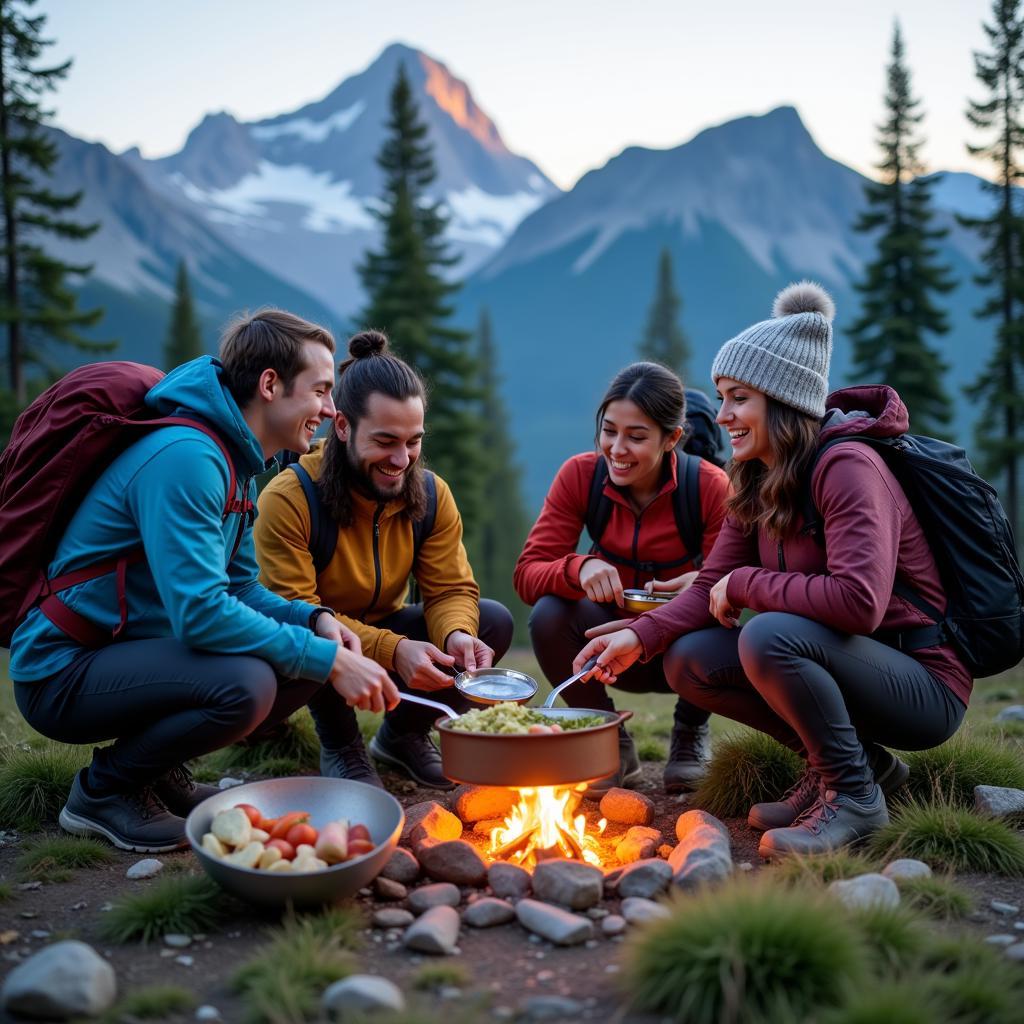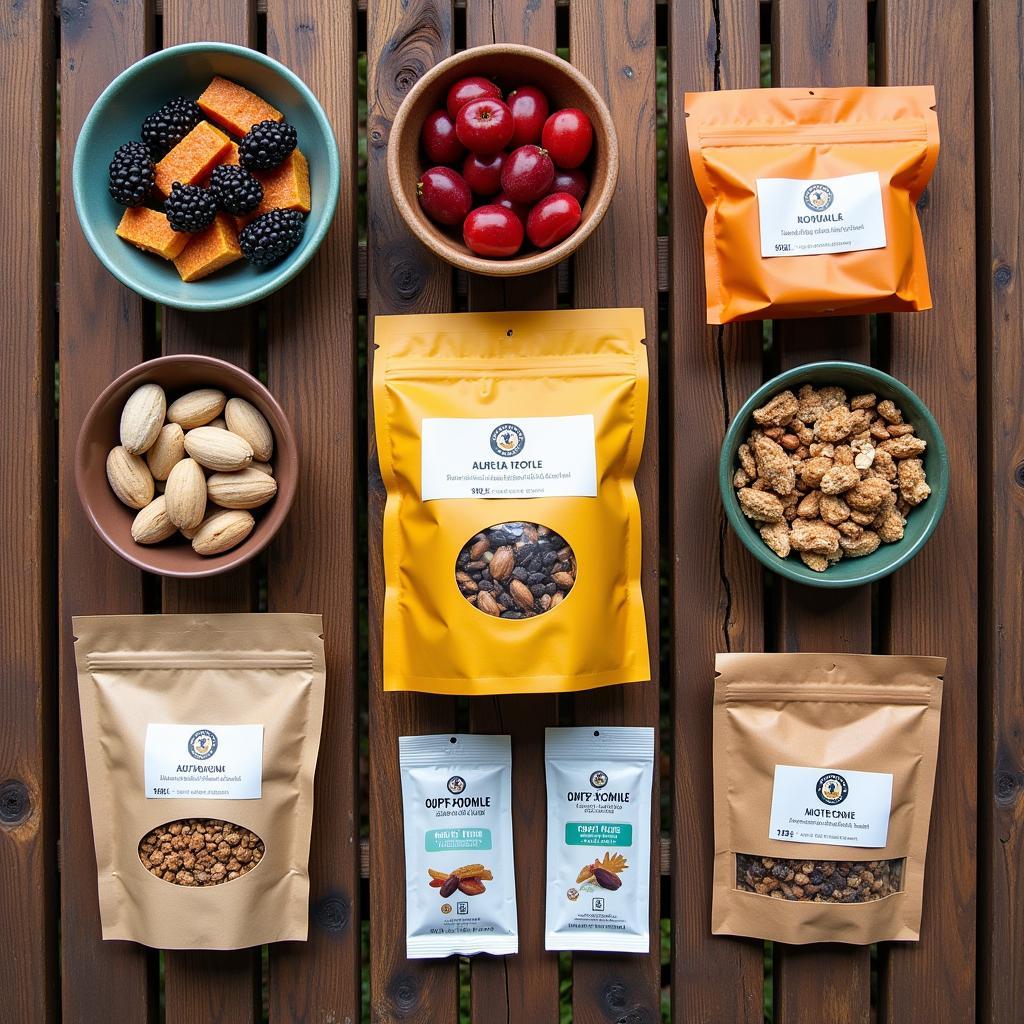Planning an epic backpacking adventure? Whether you’re conquering the Pacific Crest Trail or exploring local trails, your choice of food can make or break your trip. Bulk Backpacking Food is the savvy hiker’s secret weapon to staying energized, satisfied, and on budget. Let’s dive into everything you need to know about fueling your next outdoor escapade.
What is Bulk Backpacking Food?
Bulk backpacking food simply means purchasing larger quantities of food ideal for backpacking trips. This approach offers significant cost savings and allows you to customize your trail meals to your exact preferences. Think beyond the pre-packaged meals and unlock a world of delicious possibilities.
Benefits of Going Bulk
 Backpackers enjoying a meal on the trail
Backpackers enjoying a meal on the trail
Why do seasoned backpackers love bulk?
- Cost-Effective: Buying in bulk typically yields lower prices per unit compared to single-serving options.
- Customization: Tailor your meals to your dietary needs and taste preferences.
- Reduced Packaging: Minimize your environmental impact by buying in bulk and reducing single-use packaging waste.
- Portion Control: Package your own meals in reusable containers or bags for perfectly portioned energy boosts.
Choosing the Right Bulk Backpacking Food
 A variety of backpacking food laid out on a picnic table
A variety of backpacking food laid out on a picnic table
Selecting the right food for your adventure is key to staying energized and satisfied on the trail. Here are some top considerations:
- Lightweight: Opt for dehydrated or freeze-dried ingredients to keep your pack weight manageable.
- Calorie-Dense: Prioritize foods that pack a caloric punch to sustain you during strenuous hikes. Nuts, seeds, and dried fruits are excellent choices.
- Nutritious: Choose a variety of food groups to ensure a balanced intake of carbohydrates, protein, and fats.
- Shelf-Stable: Select foods that can withstand temperature fluctuations and won’t spoil easily.
Pro Tip: Consider incorporating freeze dried camping food into your bulk plan. These meals are incredibly lightweight, flavorful, and require only hot water for preparation.
Essential Bulk Backpacking Food Categories
1. Grains and Starches
- Instant Rice: A quick-cooking and versatile carbohydrate source.
- Couscous: Similar to rice, couscous cooks quickly and pairs well with various flavors.
- Pasta: Choose smaller pasta shapes for faster cooking times.
- Instant Oatmeal: A warm and comforting breakfast option.
2. Protein Powerhouses
- Tuna Pouches: A convenient and shelf-stable source of protein.
- Salami and Jerky: Dried meats provide a concentrated source of protein and flavor.
- Nuts and Seeds: Offer healthy fats, protein, and essential nutrients.
- Powdered Peanut Butter: A less messy alternative to traditional peanut butter.
3. Fruits and Vegetables for Flavor and Nutrients
- Dried Fruit: Lightweight, naturally sweet, and packed with energy.
- Dehydrated Vegetables: Add flavor, texture, and nutrients to your meals.
- Powdered Greens: A convenient way to boost your intake of vitamins and minerals.
- Fruit Leather: A tasty and chewy treat.
4. Flavor Essentials
- Spices and Seasonings: Elevate your trail meals beyond bland and boring.
- Salt and Pepper: Essential for enhancing flavors.
- Bouillon Cubes: Add depth of flavor to soups and stews.
- Honey or Maple Syrup: Natural sweeteners for your oatmeal or snacks.
Creating Delicious and Easy Bulk Backpacking Meals
Get creative in the kitchen and pre-package your own culinary masterpieces. Here’s some inspiration:
Breakfast:
- Overnight Oats: Combine rolled oats, powdered milk, chia seeds, nuts, and dried fruit in a reusable bag. Simply add water and let it soak overnight.
- Backpacking Pancakes: Prepare a dry mix of pancake mix, powdered milk, and your favorite spices. Add water, cook on a lightweight stove, and top with dried fruit or nuts.
Lunch:
- Trail Mix Power-Up: A mix of nuts, seeds, dried fruit, pretzels, and chocolate chips provides a satisfying energy boost.
- Tuna Wraps: Spread tortillas with cream cheese, add tuna, and your favorite veggies for a refreshing and protein-packed lunch.
Dinner:
- One-Pot Pasta Primavera: Combine pasta, dehydrated vegetables, and a creamy sauce mix for a flavorful and comforting dinner.
- Lentil Soup: A hearty and protein-rich soup made with lentils, dehydrated vegetables, and spices.
Pro Tip: Check out our guide to survival camping food for more meal inspiration and tips on packing for emergencies.
Expert Insights on Bulk Backpacking Food
Sarah Jones, a certified nutritionist and experienced backpacker, shares her thoughts:
“Packing nutrient-rich bulk backpacking food is essential for maintaining energy levels and supporting overall health during multi-day treks. Prioritize a balance of carbohydrates, protein, and healthy fats, and don’t forget to stay hydrated.”
Planning Your Bulk Backpacking Food Supply
- Trip Duration: Calculate the total number of meals you’ll need based on the length of your backpacking trip.
- Daily Calorie Needs: Consider your activity level and adjust your calorie intake accordingly. Backpackers typically need more calories than their sedentary counterparts.
- Food Preferences: Make a list of your favorite foods and ensure you include a variety of flavors and textures.
- Storage: Invest in durable, reusable containers or bags for storing your bulk food items.
Pro Tip: Explore the benefits of freeze dried food for their extended shelf life, lightweight nature, and ease of preparation.
Conclusion
Mastering the art of bulk backpacking food empowers you to embark on unforgettable adventures while savoring delicious and nourishing meals. By planning ahead, choosing the right ingredients, and embracing your inner trail chef, you’ll fuel your body and soul for every step of your journey.
Ready to take your backpacking cuisine to the next level? Browse our selection of backpacking food organic options and discover a world of flavorful possibilities.
FAQs
1. How much weight should my backpacking food weigh?
On average, aim for 1.5 to 2 pounds of food per person, per day. This can vary depending on your metabolism, activity level, and the calorie density of your chosen foods.
2. What are some good snacks for backpacking?
Trail mix, energy bars, dried fruit, jerky, and nut butters are all excellent backpacking snack options. They are lightweight, calorie-dense, and provide sustained energy.
3. Can I bring fresh fruits and vegetables on a backpacking trip?
While tempting, fresh produce can spoil quickly and add unnecessary weight to your pack. Opt for dehydrated or freeze-dried alternatives to enjoy the flavors and nutrients without the spoilage risk.
4. How do I store my backpacking food properly?
Use airtight containers or bags to protect your food from moisture and pests. Consider using odor-proof bags for strong-smelling items like spices or tuna.
5. Where can I find more information about backpacking food safety?
Consult reputable sources like the USDA Food Safety and Inspection Service or the National Park Service for comprehensive guidelines on backpacking food safety.
Need Assistance?
Our dedicated customer support team is here to assist you 24/7. Reach us at Phone Number: 02437655121, Email: minacones@gmail.com or visit our location at 3PGH+8R9, ĐT70A, thôn Trung, Bắc Từ Liêm, Hà Nội, Việt Nam.